- Home
- Alice Hoffman
Seventh Heaven Page 5
Seventh Heaven Read online
Page 5
Billy hunched over on the stoop as he watched the last of the children walk to school. They all had lunch boxes, and Billy knew that Nora had made his lunch the night before, in case she overslept, and that she had put his sandwich and his orange into a small brown paper bag. He thought of his father’s blackout trick, the piece of magic in which nothing was left but his clothes, and he wondered if you could inherit a talent like that. He could almost believe he was becoming invisible; he could feel something curling up inside himself. While Billy was eating the last cookie, Ace McCarthy came outside. He was wearing a white shirt his mother had ironed while he had breakfast, and a pair of black slacks the Saint had made him promise he’d throw out because they were so tight. He stood in his driveway and shook a cigarette out of his pack of Marlboros.
“Hey.” He nodded to Billy Silk across the lawn.
Billy stared at Ace and chewed his cookie. Ace was about to go get Danny Shapiro so they could walk to school together. Instead, he crossed the lawn. There was dew on the grass and it left droplets on his black boots.
“Damn it,” Ace said when he saw that his boots were wet. He went over to Billy and smoked his cigarette, keeping an eye out for his mother next door, just in case she looked out her window and caught him smoking. “You live here?” Ace asked.
Billy nodded and curled his toes.
Ace pointed his cigarette at Billy and closed one eye thoughtfully. Smoke circled around him. “Second grade,” he guessed.
“Third,” Billy Silk said.
“Poor guy,” Ace said. He noticed that Billy was still in his pajamas. “Your father’s going to let you have it.”
“Nah.” Billy rolled a raisin over his tongue. “He’s gone.”
“Gone?” Ace said, surprised. “What are you? An orphan?”
“Nah,” Billy said. “He’s in Las Vegas.”
“No kidding,” Ace said, impressed.
The front door opened and Nora stood there in her nightgown, holding James on her hip.
“You should be dressed,” Nora called to Billy. “Your feet will freeze. You’ll be late. Gee whillikers, buddy, let’s move it.”
Ace McCarthy stared at the front door after Nora had closed it.
“That’s your mother?” Ace asked, and when Billy nodded, Ace shook his head. “Wow,” he said.
“What’s that supposed to mean?” Billy said, insulted, although he wasn’t certain why.
“Nothing,” Ace said, stubbing out his cigarette under his boot heel. “She just doesn’t look like somebody’s mother.”
“Yeah,” Billy Silk said, and in a way he knew what Ace meant.
“See ya,” Ace said. He walked down the driveway as if he had all the time in the world to get to school. Billy sat on the stoop until Ace had called for Danny Shapiro. He watched them head down Hemlock Street, and then he felt silly being outside in his pajamas, so he went in and got dressed while Nora fed the baby his breakfast.
“Let’s go, let’s go,” Nora kept calling, even though she wasn’t ready herself. She appeared in the doorway of Billy’s bedroom in a black dress and black high heels as he was examining his new blue looseleaf. Around her waist she had on a black-and-gold cinch belt with a big gold buckle.
“There’s nothing to be nervous about,” Nora told Billy.
Her face was flushed, and today her nails were passion-fruit pink.
“I’m not nervous,” Billy said, although actually he thought he might faint.
The elementary school was only three blocks away, but because they were late, Nora drove. The Volkswagen hadn’t had time to warm up; it chugged and bucked and the engine threatened to cut out completely. Nora pulled over across from the U-shaped driveway where buses were parked. There were only a few latecomers running through the doors, but the air still smelled of peanut butter and Ivory soap and gasoline. Nora took the key out of the ignition. She looked in the rearview mirror, adjusted her gold headband, and fluffed out her bangs.
“So?” Nora said to Billy.
“So I’m not going,” Billy said.
“Oh, yes you are,” Nora told him.
“You don’t even look like somebody’s mother,” Billy said.
“I’ll take that as a compliment,” Nora said. “So thanks a million, buddy.”
Nora stepped out, then went around the car, opened the rear door, and picked up the baby. She waited for Billy on the curb. Sooner or later, he had to come out of the car. Another mother was leaving the school; she was wearing Bermuda shorts and a kerchief over her hair. Nora readjusted her cinch belt. She had a pair of Bermuda shorts somewhere; she used to wear them when she washed the floors in their old apartment. She scrunched down so she could see herself in the side-view mirror. Maybe she shouldn’t have worn eye makeup; maybe she shouldn’t have sprayed herself with Ambush. She tapped on the window and Billy looked over at her.
“Come on,” Nora mouthed through the glass.
Billy unlocked his door, then got out and followed his mother across the street. Nora’s high heels made a clicking sound as they walked toward the principal’s office. She had James hoisted over her shoulder, and the baby reached out his arms toward Billy and shouted, “Baba,” his voice echoing down the hall. Billy hung back, so that he wouldn’t be seen with them; he held his lunch bag tightly.
“What are you, a slowpoke?” Nora called over her shoulder. She should have made Billy bacon and eggs for breakfast to give him extra energy. She used to make that for Roger before he went out to perform, until she found out he was performing with his girlfriends more often than he was onstage. The morning he left her, Nora had given him a mixture of henna and onions and eggs, and that had fixed his wagon. When Roger finally called from Las Vegas he confided that he’d had diarrhea for over two thousand miles. As if she cared! As if he expected free medical advice!
“Well, great,” Nora had told him. “That just proves what a shit you are.”
When they reached the principal’s office, Nora had to search through her pocketbook for Billy’s medical files and the report from his previous school. She dumped everything out; tubes of lipstick and mentholated cigarettes rolled across the principal’s desk.
“I know they’re in here,” Nora said brightly. She set the baby on the floor; Cheerios fell out of the pockets of his corduroy pants. Billy Silk sat in a cushioned chair and looked up at the acoustical tile in the ceiling. James pulled himself up to stand by holding on to Billy’s leg, and Billy casually swung his leg back and forth until the baby collapsed on the floor.
“He’s very advanced,” Nora told the principal when she handed over the files.
“We’ll put him in third grade today,” the principal said, “but then we’ll have to test him to see if he’s ready.”
“Go ahead, test him,” Nora said. “But let me tell you he can practically read your mind before your thoughts are fully formed.”
“He’s had his polio shots?” the principal asked.
“Oh, yes,” Nora said. Without turning to Billy, she whispered, “Your hair.”
Billy stopped pulling on his hair. Nora leaned down and gathered up stray Cheerios.
“I love this school,” Nora said, as the principal guided them out to the hallway. “It’s so cheerful.”
Billy studied the pale gray walls; he was certain they were the exact shade of gray used to paint prison cells.
“Third grade is two doors past the gym,” the principal said. “Do you think you can find your way, Billy?”
Billy looked up at the principal for the first time.
“He’s in Las Vegas,” Billy said.
“Who’s that?” the principal said, flustered.
“My father,” Billy said.
The principal turned to Nora. “There wasn’t any mention of your husband in Billy’s files.”
“Las Vegas,” Nora said. “Nevada,” she added as she shoved Billy in front of her and guided him toward the gym. “Stop listening in to people,” Nora told him.
&nbs
p; “I can find the room by myself,” Billy said.
“I mean it,” Nora said. “People don’t like being eavesdropped on.”
They stopped outside the door to the third-grade classroom. Billy could see an American flag hanging from a wooden pole above the windows.
“All right,” Billy told his mother, although he didn’t know whether or not it was in his power to keep his promise. It might be like his vow not to eat. “I’ll stop.”
“Good,” Nora said. “Do you have everything? Looseleaf? Pencils?”
Billy nodded.
“Gee whiz,” Nora said. “You’re so pale.”
She touched Billy’s forehead to feel for a fever. They could hear the teacher inside asking someone to hand out the readers.
“It’s not going to kill you, you know,” Nora said. “All you have to do is relax.”
“Yeah,” Billy said.
“Just expect them to like you and they will,” Nora said.
“You can have one when you get out to the car,” Billy said.
Nora pursed her lips and gave him a little push. She waited until he had gone into the room and closed the door behind him; then she hurried out to her car, and the first thing she did once she had gotten James into the backseat was take out her pack of cigarettes and immediately light one.
SO NORA WAS WRONG, SHE’D BEEN WRONG ABOUT other things before, she wasn’t perfect. If she were perfect, would she be manicuring other women’s nails on Saturdays while a sixteen-year-old neighbor she barely knew watched her children? If she were perfect, would she be trying to unclog the bathtub while her ex-husband was sending photographs of himself in front of the Sands Hotel, where Frank Sinatra was appearing nightly? So she couldn’t fit into her red toreador pants anymore, so she’d sold only fourteen subscriptions to Life and three to Ladies’ Home Journal in two weeks, so the kids in his class hated Billy, so what? Things changed, didn’t they? She planned to make a huge platter of cupcakes, frosted pink and dotted with gumdrops, to take in to Billy’s class at the end of the week. She’d get a class list and go right down it, inviting every goddamned child over, popping fresh popcorn for them, letting them run wild, bribing them with lemonade and cap guns. She’d start selling Tupperware, she could bring the baby with her into people’s living rooms, she could have Tupperware parties right in her kitchen. And if she kept eating grapefruit, she’d fit into the toreador pants soon enough.
The stars, after all, were much brighter here than they’d ever been in the city. The evenings smelled like cherries instead of soot. Sometimes, late at night, after the children were asleep, Nora went out and walked across the lawn in her bare feet. You could feel autumn approaching here, the grass was colder, the mornings darker. Nora didn’t think about anyone kissing her, she didn’t think about dancing all night, or holidays spent at the seaside in a hotel room with a man whose name she didn’t even know. She put one of her Elvis albums on the old record player and figured out how to hang the storm windows. She sang “Don’t Be Cruel” and lined the broiler pan in her oven with tin foil. She pulled her hair back into a ponytail and put on one of Roger’s old shirts. The other mothers on the street could see her, up on a stepladder with a rag in her hand. Beside the ladder, her baby played in the dirt and she didn’t seem to notice that his socks were black and his hands were caked with mud. The baby put twigs and fallen leaves into his mouth, and all he wore was a light woolen sweater over thin pajamas. The mothers on the block thought they could hear her singing “A Fool Such as I” as she washed her windows. They saw the bottle of Windex in her hand and they noticed that she wore no wedding ring.
“Maybe her finger’s swollen and her ring is on one of the hooks along with her coffee cups,” Lynne Wineman said.
“You think so?” Ellen Hennessy said. “Then where’s her husband?”
They thought that one over carefully. They were sitting in Ellen Hennessy’s living room and they had a perfect view of their new neighbor through Ellen’s front window.
“Traveling salesman?” Donna Durgin said, but everyone knew Donna was extremely naïve, and they overlooked her innocence just as they did her excess weight.
“Are you thinking what I’m thinking?” Lynne Wineman asked Ellen Hennessy.
Ellen’s boy, Stevie, was at school, and her little girl, Suzanne, was having a tea party in her room with Lynne Wineman’s two little girls. Donna’s eighteen-month-old, Melanie, was asleep on a blanket under the coffee table.
“You bet,” Ellen Hennessy said. “It’s the only explanation.”
“What?” Donna Durgin said. “What is?”
But they couldn’t answer her, they couldn’t bring themselves to say the word divorced out loud, and yet there it was, across the street, a hand without a ring holding a Windex bottle. They were all so completely married, and they were in it together. Ellen Hennessy and Donna Durgin and Lynne Wineman saw each other nearly every day. In the summer they had picnics for their children in each other’s backyards, with Hawaiian Punch and bologna sandwiches, they lent each other’s children clothes theirs had outgrown, they went food shopping together, they played canasta while their children played with wooden blocks and left a carpet of graham cracker crumbs all over the floors.
The women decided to phone Marie McCarthy. And when she came over, they sat around her in a semicircle, eager to hear her opinion of their new neighbor. Marie’s children were grown, and the other mothers didn’t see her quite as much, but each of them knew you could always call Marie in the middle of the night when your littlest child was burning up with fever and she’d know exactly what to do. She would tell you to rub a little rum on your baby’s gums when his molars were coming in and nothing the doctor had suggested would ease his crying; she had great recipes for lasagna and meatloaf with green onions and tomato sauce; she’d watch your kids if you had a dentist appointment, or if you desperately needed a new dress and didn’t want to drag the kids with you to S. Klein or, if the dress was for a really special occasion, A&S. If you had a fight with your husband, one he might not have even noticed, you could sit in Marie’s kitchen and she wouldn’t bother you with questions. She’d just give you cookies and tea and let you sit there until you could find it in your heart to go home.
She’d been through it all, and that gave you hope, but even Marie had trouble with the idea of a divorced woman alone on their street. She should have already asked a newcomer over for coffee, she should have offered to sit for her kids. But she knew something wasn’t right as soon as she saw that woman in that beat-up Volkswagen with just her two boys. Where was the man? That was what Marie asked the other mothers. “I think you’ve got a pretty good idea,” she whispered, so that even Donna Durgin, who had never met a divorced person in her entire life, figured out Nora’s situation. No one had to say it, but the word was there, it had entered their vocabularies and now hung above them, a cloud over their coffee cups, and maybe that was why they didn’t speak, and why Marie passed out some of the Tootsie Rolls she had brought over for the children to their mothers instead, even though candy couldn’t begin to get rid of the sour taste in their mouths.
As usual, the men on the street noticed nothing. Oh, they saw the Volkswagen and they figured it needed its tires aligned. They saw that no one had fixed the broken shutters, and they themselves would have gotten a bucket of cement and fixed the steps leading to the stoop as soon as they’d moved in. As a detective, Joe Hennessy prided himself on picking up details no one else would bother with, but later that day, when he came home and put his gun in the night table, he didn’t notice that his wife had bitten her fingernails down to the quick. He changed out of his sport coat, then filled up a plastic bucket with soapy water. It was still light enough in the evenings to get some work done around the house, so Hennessy went out to wash his car. When he carried the bucket out to the driveway, water spilled over the sides and left a trail behind him. He put down the bucket, and as he reached for a sponge he had that feeling along the back of his ne
ck. He thought about moonlight, he thought about his neighbor up on her roof in the dark, he felt as if he needed to run somewhere, as fast as he could. The white Volkswagen parked in the Oliveras’ driveway shone in the last of the day’s light.
Hennessy shielded his eyes and looked across the street. There was the baby, out in its playpen in the front yard. Hennessy thought the baby might be waving at him, or maybe it was just grabbing for stray blades of grass, because there was a whirlwind of grass as Nora Silk came around the side of the house, pushing Olivera’s old mower. She had all her weight behind the mower, which chugged like a locomotive and threw off black smoke. Right behind her was the boy, who dragged a tall wooden rake.
Hennessy wondered what kind of man let his wife work in the yard. A flower garden was an exception, women liked that kind of thing, but a well-kept lawn was a different story. And here was the wife, working like a dog, wearing leather gloves so she wouldn’t get blisters on her hands, wobbling over the weeds in her sling-back pumps. Hennessy watched Nora struggle to make a turn in the grass. The mower got stuck in the tallest of the weeds, it wouldn’t go backward or forward, and although the motor would start, it kept cutting out on her. Hennessy had been Olivera’s neighbor for five years, but he had been inside the house only once, near the end, the old man’s arthritis was acting up and Hennessy had gone over to bleed the radiators with a dime and check out the boiler in the basement, which, as it turned out, wasn’t really necessary, since the old man had died right after Thanksgiving. Hennessy tossed his sponge into the bucket of water and walked across the street.
“Goddamn it,” she was saying, right in front of the boy. Or at least that’s what Hennessy thought she was saying, but it was hard to hear over the roar of the old mower. There was grass everywhere, in the folds of her cotton shirt, in the baby’s hair. Hennessy could taste the grass in his throat and it made him thirsty; his neck felt worse than ever.

 The Story Sisters
The Story Sisters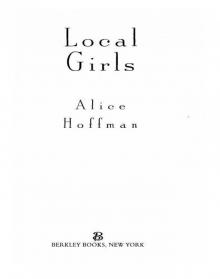 Local Girls
Local Girls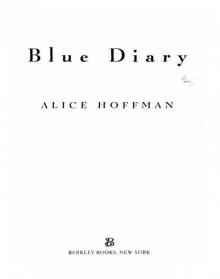 Blue Diary
Blue Diary The River King
The River King Here on Earth
Here on Earth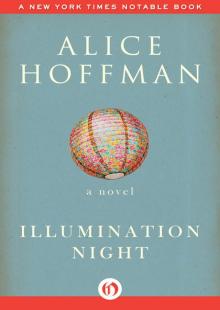 Illumination Night: A Novel
Illumination Night: A Novel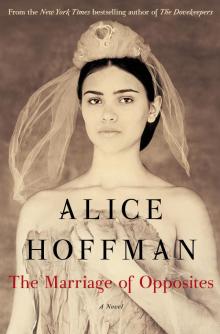 The Marriage of Opposites
The Marriage of Opposites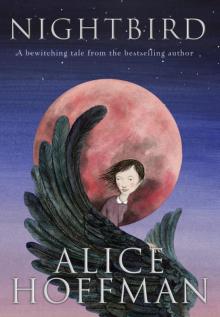 Nightbird
Nightbird Incantation
Incantation Skylight Confessions
Skylight Confessions The Ice Queen
The Ice Queen Second Nature
Second Nature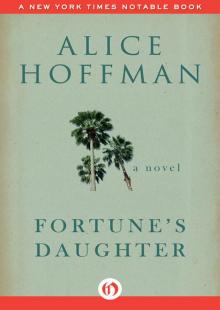 Fortune's Daughter: A Novel
Fortune's Daughter: A Novel Seventh Heaven
Seventh Heaven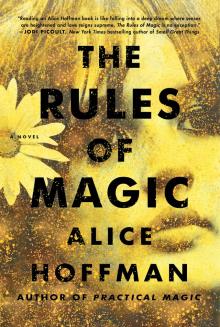 The Rules of Magic
The Rules of Magic The Red Garden
The Red Garden The Third Angel
The Third Angel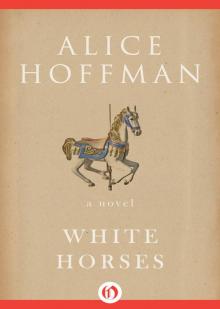 White Horses
White Horses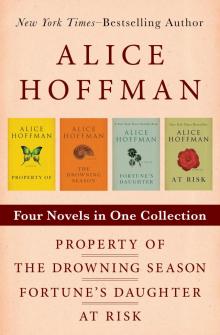 Property of / the Drowning Season / Fortune's Daughter / at Risk
Property of / the Drowning Season / Fortune's Daughter / at Risk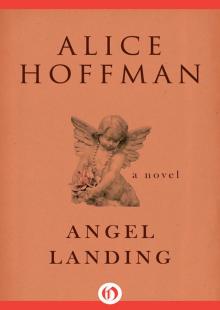 Angel Landing
Angel Landing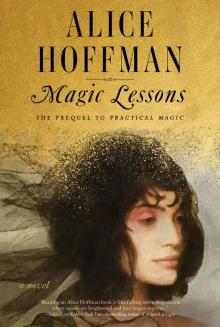 Magic Lessons
Magic Lessons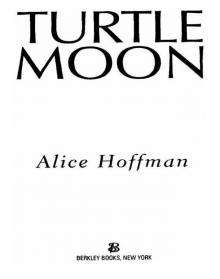 Turtle Moon
Turtle Moon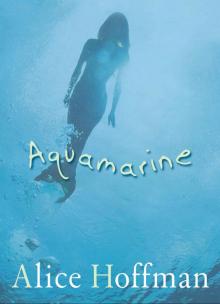 Aquamarine
Aquamarine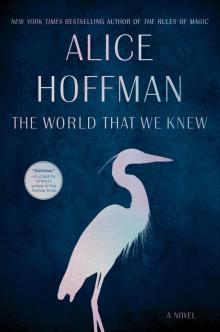 The World That We Knew
The World That We Knew Faithful
Faithful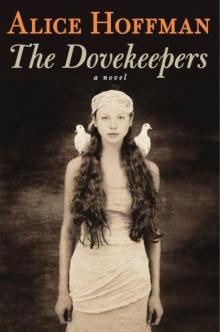 The Dovekeepers
The Dovekeepers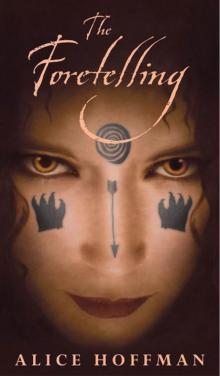 The Foretelling
The Foretelling Green Angel
Green Angel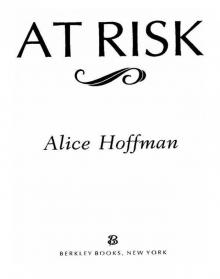 At Risk
At Risk Green Heart
Green Heart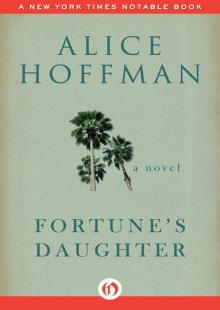 Fortune's Daughter
Fortune's Daughter Faerie Knitting
Faerie Knitting Incantation (v5)
Incantation (v5) Green Witch
Green Witch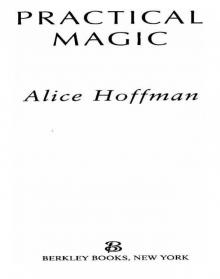 Practical Magic
Practical Magic The Museum of Extraordinary Things
The Museum of Extraordinary Things The Probable Future
The Probable Future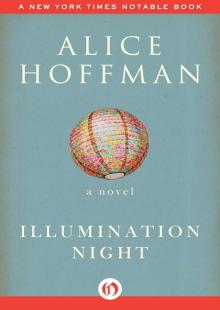 Illumination Night
Illumination Night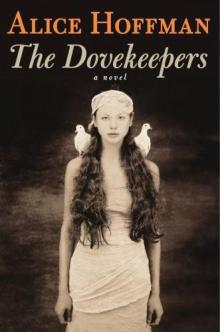 The Dovekeepers: A Novel
The Dovekeepers: A Novel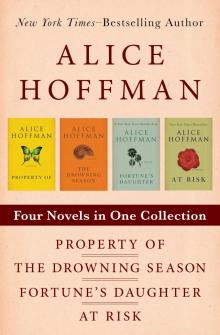 Property Of, the Drowning Season, Fortune's Daughter, and At Risk
Property Of, the Drowning Season, Fortune's Daughter, and At Risk